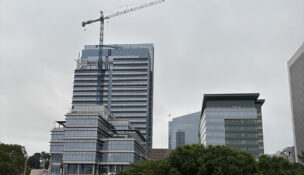Where is the U.S. economy headed?
With the federal budget deficit projected to hit $590 billion by the end of the year — 3.2 percent of the country’s GDP — rating the state of the U.S. economy as a 5 on a 10-point scale may seem optimistic, especially since some experts offered an assessment as low as a 3 on Thursday.
Yet 5 was the grade that many members of a Richmond audience of about 110 commercial real estate professionals gave during an event sponsored by the local chapter of IREM (Institute of Real Estate Management) at the Country Club of Virginia.
Rep. Dave Brat, R-7th, a free market advocate and former economics professor at Randolph Macon College, described the economy as being “on a sugar high.”
“We had zero percent interest rates for years. Debt [held by the public] will hit $14 trillion by the end of the year … So how’s the economy? Not hot,” he said.
Some of the economic fundamentals rebounded since the Great Recession of 2007-09, added Brat. “It’s not all gloom and doom. I’d give it a 3 out of 10.” Yet with the economy’s annual growth rate now at only 1.2 percent with the Fed Reserve’s stimulus programs still in place, “I don’t care what the jobs numbers are — if you took the Band-Aid off, it would be a different story.”
The GDP annual growth rate is expected to rise to 2 percent or slightly higher by the end of the year, which could trigger a hike in interest rates by the Fed.
While panelists did not want to make that call, some were more optimistic than Brat. Ray Owens, a senior economist/research adviser with the Federal Reserve Bank in Richmond, gave the economy its highest rating, 8. “We have big risks, but we are much closer to our potential growth than many people believe,” he said.
With baby boomers turning 65 at the rate of 10,000 a day and many of them retiring, the working-age population is declining, a development that is expected to lead to lower productivity. “We aren’t getting replacements for the boomers,” Owens said, at least not in the numbers that boomers provided when the country’s labor force participation rate peaked in 2000 to 2002. That’s when many of the oldest boomers were turning 55.
However, employers are hiring, and the U.S. is seeing a bit of a rebound. The nation’s unemployment rate in July was 4.9 percent. “The millennial generation is quite large, nearly as large as the boomers,” Owens said, adding that, over time, the labor participation rate is expected to level out.
The need for labor plays into immigration issues, said Brat. “Firms tell me they need more labor. We’ve brought in 3 million immigrants. …. If you bring in more, you displace people who already can’t find jobs in the inner cities.”
One of the drivers behind the country’s growing budget deficit is a drop in payroll tax receipts, said another panelist, Michael Walsh, director of debt management with the Virginia Tech Foundation. “What that tells you is that we are replacing good-paying jobs with lower-paying jobs. And instead of folks working full time, they’re working part time. That tells a story in Virginia and nationwide. We’re not creating the jobs and the quality [of] jobs to sustain the economy.”
Walsh rated the current state of the economy as a 4. With interest rates at such low levels, “I’m becoming more concerned about asset bubbles, the equity markets at a historic high and the same with the bond markets. So I’m concerned that if the Fed does anything, the house of cards is going to come down.”
Walsh also voiced concern about pensions at the state and local level. “This is a time bomb that is ticking that is going to explode.” Virginia’s retirement system looks “fantastic,” he said, compared with other states where pension programs are eating up more of their budgets.
Walsh and others also touched on the economic impact of millennials. “They have a different mindset,” he said. “They saw the real estate bubble and the great crash. They understand that they have to take care of themselves. The jobs weren’t there when they got out [of school], so they understand that they have to be much more entrepreneurial and to succeed they have to move around and be agile.”
Many millennials are marrying, starting families and buying homes later in life, a trend also impacts the economy when it comes to goods and services.
Bill Barnett, a senior vice president and partner with Commonwealth Commercial Partners LLC in Henrico County, weighed in with a baby-boomer view. He gave the economy a 5 and said his company is doing well. “I wake up every morning excited about what I do. The young men and women we have in our company challenge me and not just electronically, but in other ways. … I think the best part of the real estate business is ahead of me.”
He advises young workers to “align yourself with an employer and customers who will be sustainable.” The train reck that Brat describes, with the country’s massive debt, “that’s been coming down the track. We’ve known this for 40 years,” Barnett said. “But you still have to get up and go to work every day.”
Economic growth and increased business investment would go a long way in stabilizing the U. S. economy, said Brat. The middle class is angry, he added, because of stagnation in wages, a sentiment that has played out in this year’s election with candidates coming from outside of Washington’s political sphere.
“All these outsiders, the outsider votes for BREXIT [Britain’s impending exit from the European Union] is the same thing. There’s this huge sense that something is going way wrong, and the average guy is getting run over by a Mack truck,” he said.
P

















